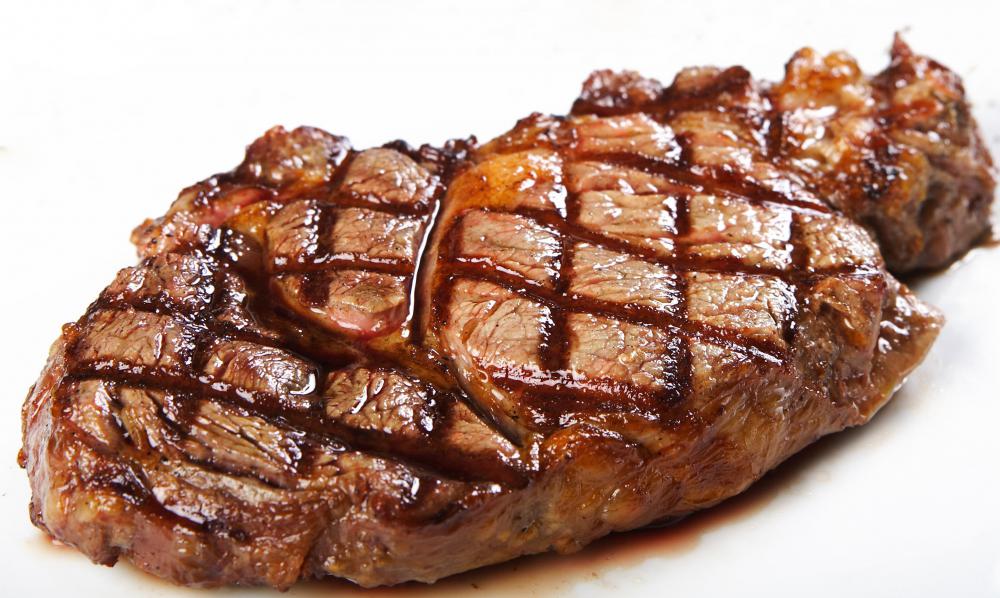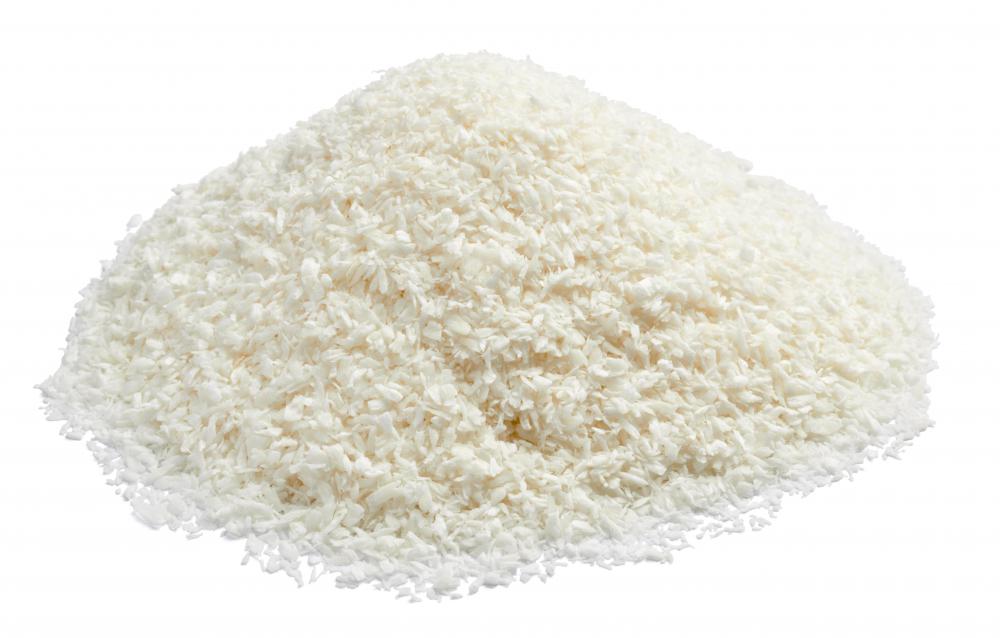At WiseGEEK, we're committed to delivering accurate, trustworthy information. Our expert-authored content is rigorously fact-checked and sourced from credible authorities. Discover how we uphold the highest standards in providing you with reliable knowledge.
What Are Saturated Fatty Acids?
Saturated fatty acids are characterized by a single bonding position between their hydrogen carbons. In contrast, unsaturated fatty acids have double bonding between their hydrogen carbons. Saturated fatty acids are found in sources of saturated fat, such as red meat and milk.
A number of different saturated fatty acids make up saturated fat. There are three common types which are known as lauric, palmitic and stearic acids. The melting point — or the temperature that causes a saturated fat to change form — is usually higher than it is for unsaturated fats.

Nutrition labels do not typically separate out or identify the types of saturated fatty acids that foods may contain. Animal products such as meat and eggs tend to contain palmitic and stearic acids. These types of acids are also found in chocolate and nuts. Saturated oils tend to contain lauric fatty acids.
There are many food sources of saturated fatty acids. Some of these sources are certain categories of oils. Many of the oils that are high in saturated fat are tropical oils and include sources such as coconut, palm and kernel. Many dairy and animal products also tend to be high in saturated fat.

While food manufacturers have made incredible strides in reducing the saturated fat content of dairy and meat products, they are still one of the primary dietary sources. Low-fat versions of cheese, milk and yogurt still contain traces of saturated fat. Even though this type of fat cannot be avoided completely, dietary recommendations call for its limitation.

Unsaturated fats such as olive and peanut oil also carry trace amounts of saturated fatty acids. The proportion of unsaturated to saturated fat is usually high enough to classify these food sources as unsaturated. Trace amounts are not considered to be dangerous or to be causes of adverse health effects.
Saturated fats also contain some unsaturated fat. Some sources of saturated fat, such as lard or butter, may contain higher amounts of some unsaturated fats. Despite some of these proportion inequalities, they are still considered to be saturated since the total amount of saturated fat exceeds the total amount of unsaturated fat.
Consuming a large amount of saturated fat is thought to lead to the development of several diseases and complications, including heart disease, cancer and obesity. These fats are also linked to high cholesterol levels. High-density cholesterol, which can lead to the hardening of arteries, has been shown to rise with increased consumption of saturated fatty acids.
AS FEATURED ON:
AS FEATURED ON:













Discussion Comments
My friend’s daughter developed high cholesterol because she ate a lot of fast food and her doctor suggested that she take in some fish oil supplements.
He said that any of the Omega 3 vitamins would work. They even have some fish oil gummy vitamins for kids and they say that it tastes a little like candy. The fish oil supplements really clear out the blockage in the arteries that is caused by high cholesterol and it also brings down the cholesterol to a normal range.
I think the confusion over the benefits and dangers of saturated fatty acids has to do with the fact that we still don't know the exact amounts of fats, proteins, carbohydrates and fibers required for optimal health.
A couple of decades ago, the major health concern among Americans was coronary heart disease. Now it's obesity and diabetes. I'm pretty sure our eating habits and exercise habits (or lack thereof) are responsible for these changes.
I just want one authority to come out and tell me how I should eat. How can we eat correctly when every expert says something different?
@fify-- I'm all for all-natural eating. The way I see it, nature wouldn't have provided us with saturated fat, if we weren't meant to have any. Obviously eating meat three times a day and putting butter over everything isn't going to help your heart much.
But I think it's much better to consume all natural foods with some saturated fats than synthetically produced foods that have none. When it became a trend to eat low-fat foods and foods with unsaturated fat, my wife picked up on it too and started eating things like "I can't believe it's not butter."
When these things first came out, we weren't really aware of what they were and how they are made. But over the years I've read so much about how these foods are made synthetically in the labs and how dangerous they might be for our health in the long term.
So we've eliminated these foods from our kitchen all together. We only eat all-natural organic foods. We buy organic whole milk and real butter and we don't need too much of it to be satisfied because it's real.
For years we have been told by doctors and health authorities that saturated fatty acids are bad for us and that we should prefer non-fat or low-fat versions of these foods.
But now, some doctors are saying that this is not true and that some saturated fatty acids are necessary in a healthy diet. Avocados, nuts and butter have a lot of saturated fatty acids in them, but apparently consuming some of these foods regularly, is actually good for us. Even dietitians are starting to make the claim that some fat intake is necessary for our system to function well and for us to reap the most benefits out of exercising and fitness.
So like all things, over-consumption of saturated fatty acids is unhealthy and moderation is key. But it's so wrong to take out these foods from our diet completely in hopes of losing weight or lowering our cholesterol.
Post your comments